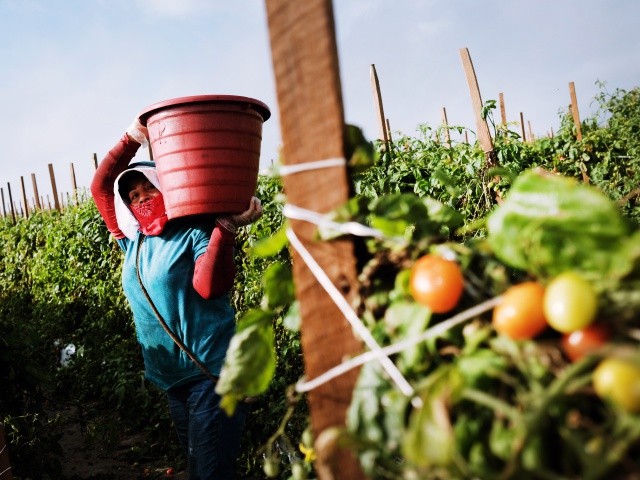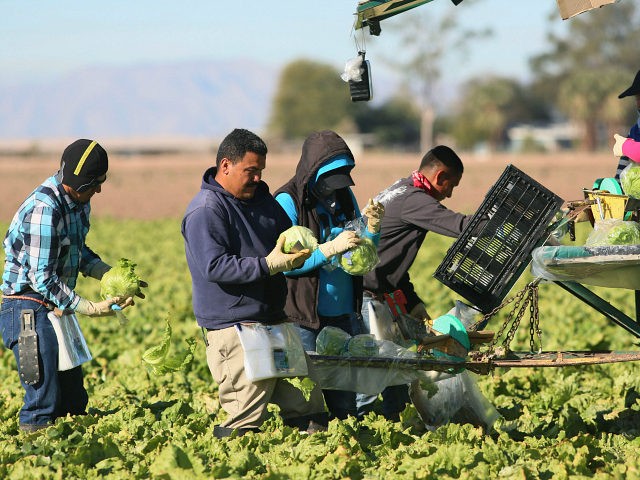Farm investors are pushing Congress to give them the legal authority to import their own workforce and to pay those foreign employees with shares of U.S. citizenship snatched from American voters.
Investors and lobbyists want Congress to create this new labor pipeline — plus an amnesty for at least one million current illegal aliens — by passing the “Farm Workforce Modernization Act” during the lame-duck session in the new few weeks.
Lobbyists are hoping the public can be distracted by other drama and that a handful of retiring GOP senators will help push the giveaway over the Senate’s 60-vote barrier, and through a packed, chaotic “Lame Duck” session before Christmas.
But there’s a political problem for the Republican Party: The party cannot win majorities in 2024 if they betray their voters after they ran on a migration reform agenda in 2022.
The exit polls in the 2022 midterms showed that immigration was the top issue for one-in-seven Republican voters. Immigration was deemed more important than crime, abortion, or gun rights, and was ranked second in importance after inflation.
“A true farm workforce modernization effort would encourage mechanization and automation through subsidies, not amnesty for illegal aliens and guaranteed flow of cheap foreign laborers for years to come,” said R.J. Hauman, the government relations chief at the Federation for American Immigration Reform (FAIR).
He slammed the stoop-labor sector within agriculture, saying, “Agricultural automation is the future of the industry — [and] another amnesty and massive expansion of a guest worker program are not.”
Watch and listen to this video. You’ll feel like you’re right there with Juan. https://t.co/EQRvTqFWwo
— 🍴Diane Wagner 🍍🍔🍪 (@DeathbedFood) November 10, 2022
In Europe, farm companies have been pressured to invest in labor-saving, wage-boosting farm technology. The increased productivity allows farm communities and their nearby town to maintain their populations and incomes.
Americana has long led the world in farm automation for row crops:
But part of the farm industry has repeatedly blocked labor reforms to preserve its access to cheap, disposable labor, Hauman said:
Every time meaningful employment and wage protections for American workers were finally within reach as part of an immigration reform proposal or because of a friendly administration, agriculture lobbyists swooped in to gut the enforcement provisions and demand greater access to cheap foreign labor. This has gone on for three decades.
The agriculture lobbyists are now in a rush to pass the bill because the next Congress, starting in January, will be far more likely to block the combined amnesty and giveaway.
“This is the best chance we’ve got of getting it done,” said one of the giveaway’s supporters, Rep. Mike Simpson (R-ID). “I think this is becoming … the last hope,” he told an NPR reporter for a sympathetic November 8 radio segment about the farm investors’ push to secede from the nation’s labor market.
The key player is Simpson’s Republican colleague, Sen. Mike Crapo (R-ID,), the top Republican in the Senate’s agriculture committee.
But Crapo has held up the bill for more than a year amid much opposition from voters in his state. That holdup has been quietly supported by passive opposition from many Republican legislators.
The bill offers an endless pipeline of cheap labor to agriculture investors in exchange for Democrats getting a new flood of naturalized, Democratic-voting immigrants.
The flood of foreign workers would damage rural Americans by lowering their wages, cutting consumer spending in towns, shrinking business opportunities, and reducing technological innovation.
The federal policy of extracting workers from foreign countries also damages those countries and kills many migrants.
The bill would also dilute the political and cultural power of native-born Americans by forcing them to share their citizenship with many additional immigrants. That process is already far advanced — the current inflow of migrants allows elites in Washington to divorce themselves from the plight of millions of sidelined Americans, drug addicts, or rural poverty.
The economic and political shift would boost the wealth and political power of the “gentry Republican” landowners — and the coastal investors — who play a large role within each district and state.
In 2019, Breitbart News reported the bargain, as described by Rep. Dan Newhouse (R-WA), who is an orchard owner and the primary GOP advocate of the bill:
It will cap the ever-skyrocketing wage growth [for H-2A workers] in this country to 3.25 percent a year. Some states next year are facing a 9.5 percent increase. On top of that, it will allow full-time employers, like dairies, to be able to take advantage and utilize the H-2A program.
Democratic cheerleader, Rep. Zoe Lofgren (D-CA) described the payout for business in the worker-for-voters swap:
The bill implements a wage freeze for the year 2020 [for 250,000 H-2A visa workers]. This is a very important matter for employers, [and] wages are expected to increase by another seven to eight percent next year. Under this bill, those wage increases won’t happen.
… a recent report by the CATO institute found that the bill, if enacted, would have saved farmers $324 million in labor expenses in 2019 alone.
The bill is being pushed by investor-backed business interests that are slipping favorable op-eds into state and local newspapers around the country.

Workers pick tomatoes at a farm owned and operated by Pacific Tomato Growers on February 19, 2021, in Immokalee, Florida. The workers are in the country on agricultural visas. (Photo by Spencer Platt/Getty Images)
Those business groups include the American Business Immigration Council (ABIC), which is closely tied to the FWD.us lobby group for West Coast investors.
Those FWD.us investors include Mark Zuckerberg, former Google CEO Eric Schmidt, and Bill Gates, the Microsoft founder who is now the biggest landowner in the United States. Investors would boost their returns if they can raise profits with cheap labor.
The FWD.us investor group backs migration because it boosts their businesses with more wage-cutting workers, more consumers, and more renters. The group has a policy of hiding its lobbying behind allied groups, such as the Presidents’ Alliance on Higher Education and Immigration and Make the Road New York. The staff of the FWD.us group tries to hide the identity of the wealthy investors who founded and funded the group. But copies exist at other sites.
These investors prefer cheap, disposable labor to their other option of investing in farm automation.
In a November 10 press statement, ABIC’s political spinoff urged Republicans to quickly cut their voters’ wages by passing the cheap-labor farm workforce act:
Americans are hurting with the highest inflation in over 40 years emptying their pocket books. Farmers are facing an extreme workforce shortage, high labor costs [emphasis added] and increasing regulatory burdens.
That is why over the last 12 months, farmers and producers across the country, from Kansas to South Dakota, Wisconsin to Arizona, have raised the urgency of fixing the agricultural workforce shortage this year.
…
Last year, the House passed the Farm Workforce Modernization Act with bipartisan support. That was a good start, and now the Senate must do its part to improve the bill and pass its own version. Time is running out – farmers and American families across the nation are looking for solutions.
The ABIC statement did not mention the flood of cheap labor invited across the border by President Joe Biden and his progressive deputies. That flood includes at least one million men, including many from agricultural communities in Central America.
But the ABIC statement included links to a series of scripted interviews and op-eds in state and local media. The media spots were aimed at North Carolina, Utah, Indiana, Maine, and Texas. A TV report from Kansas, for example, said:
Some Kansas dairy farmers are even calling for permanent legal immigration, with a potential path to citizenship for immigrant farm workers who make their families part of rural communities year round. “We have a lot of Hispanic workers that work at our dairy now,” Lee Holtmeier, Linn Willow Creek Dairy owner, said.
President Donald Trump’s broader curbs in 2020 forced farm companies to recognize the need to invest some of their profits into wage-booting technology development. The interest has created a number of cooperative efforts with Silicon Valley firms, including firms that use American workers to design and build robot crop-picking machines:
The cheap-labor farms are also losing market share to foreign farms with even cheap labor, and also to urban “vertical farming”:
Many polls show the public wants to welcome some immigration. But the polls also show deep and broad public opposition to labor migration and to the inflow of temporary contract workers into the jobs needed by the families of blue-collar and white-collar Americans.
This “Third Rail” opposition is growing, anti-establishment, multiracial, cross-sex, non-racist, class-based, bipartisan, rational, persistent, and recognizes the solidarity that American citizens owe to one another.
“Lawmakers in both parties must ignore this shameful Hail Mary effort” in the lame duck, said Hauman. They should “focus on proposals that American work that help Americans and address the border crisis,” he said.

COMMENTS
Please let us know if you're having issues with commenting.